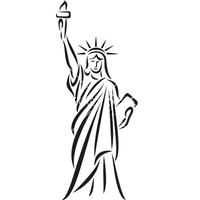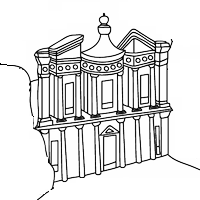Although the Constitution adopted in 1971 and revised in 1980 makes Egypt a democratic, socialist and secular state, the charta, the Islamic legislation, remains the sole source of law and law. To this end, we can say that Egypt is a Muslim state.
For centuries, this religion has shaped the Egyptian temperament as it regulated everyday life. For a Muslim of this country, religion puts forward "the knowledge and the time to live" in the relations between the men. This principle commands, for example, to the Egyptian faithful the rules of hospitality and politeness, the essence of the eminent friendliness of this people.
This religion also teaches the man who follows his teachings to always distinguish the good side of things, to be happy with what God gives him. Islam is a total system. Thanks to him, the Muslim conquers his individual independence. Thanks to him, the Egyptian society must conquer its independence vis-à-vis the West. Of course, "from the West we can learn science and technology, but we must apply Islam to politics and morality. Islam is the safeguard of a country. Islam is not only in political speeches; he is everywhere. In mosques and in the streets, in homes and in consciences. The Qur'an is constantly broadcast. By books, records, television. The radio broadcasts the prayers from two in the morning to eleven at night. At any time, the believer has his Quran at hand. Moreover, throughout the cities, loudspeakers pour verses into the streets, especially during bereavements. Islam is above all a way of life.
The nuances that influence this course of action characterize every Muslim society. In Egypt, the faithful can put his precepts into play as he pleases. There is no rite or hierarchy imposed. Only the prayer must be said five times a day by the believer, turned towards Mecca. And the obligatory common Friday prayer brings together a good part of the population in mosques.
In the ninth month of the lunar year, Ramadan imposes its rules of abstinence. During this period, prohibition of drinking, eating, smoking; ban on having sex between sunrise and sunset. The Egyptian lives at the hour of his faith. In Cairo, the two big mosques, Al-Azhar and Al-Husayn are then the rallying points of a dense and collected crowd. Then, Viftar, the breaking of the fast, will cause great rejoicing.
Islam has neither clergy nor religious hierarchy. The ulema, those who have studied, are the doctors of the Koranic law. They study the Quran to help the faithful to put it into practice and to live according to the precepts of Muhammad.
Al-Azhar, focus of thought and outreach
Originally a religious training center, Cairo's Al-Azhar Mosque has become a symbol of "knowledge" and intelligence. This is the role it keeps today. At the base are taught subjects that can be integrated into the Islamic system: the Arabic language, medicine and, of course, religious studies. But since the middle of our century, Al-Azhar has evolved. From simple medersa, it has become a university center open to many other studies. Today, its religious leaders, and especially its rector, even play an important role in the political life of the country. Because of their moral and intellectual authority, they are considered a little like the referees of the life of the country. No major political event that is marked by a rally in Al-Azhar. And nothing of the great ideas that radiate throughout the Arab world are diffused from this focus of Islamic thought. Even if, in Egypt, its educational monopoly is nibbled today by secular state universities.
The Muslim Brotherhood
Islam also colors Egyptian political life. In 1928, a young teacher from Ismaia, Hasan al-Banna, founded a movement that was to grow over the years: the Muslim Brotherhood. This grouping arises from a need to oppose Westernization and imperialism. Initially, it will be a simple religious and social phenomenon The Muslim brothers are content to found schools, clinics, hospitals, and undertake schooling of the masses. Subsequently, their good presence in the country led the Muslim Brotherhood to organize itself better and better. They even train an army. At the end of the Second World War, their organization is so powerful that it begins to frighten. The movement is dissolved. A wave of arrests, confiscations and assassinations hit its activists. We find the survivors struggling in parallel with the race to power with the "free officers", in 1952. But the objectives of each other diverge. The officers want to overthrow the king, while the Muslim brothers play King Farouk's card. At the beginning of his term, Nasser does not worry about the brotherhood. Yet it is intensifying its action among the masses and within the unions. The signing by Nasser of the treaty with the English sets fire to the powder. The Brothers find, the Rais too indulgent and wait for his life. He escapes. But the brotherhood is dissolved again and many imprisoned Brothers. Following a second plot discovered by Nasser in time, Raïs will do what is necessary to silence this movement.
Since 1970, the current once incarnated by the Muslim Brotherhood is reforming in an association called the Islamic Groups. This movement strives to regain the middle classes and advocates Muslim fundamentalism, the strict application of the Koran. These groups reject the Western world and its civilization as a whole. Their opposition to the policies of President Sadat became inevitable, they criticize his policy of openness to the West and, after the signing of peace with Israel, "to have sold the Arab interests and increased the misery of the people."
Power will be forced to make concessions to fundamentalist Islam. Presidential decrees declare a crime punishable by the death penalty the apostasy of the Muslim religion. Adultery and alcoholism are severely repressed. Sadat's intention is to bring the entire Egyptian justice system into conformity with the Qur'anic law. But he must soon return to his commitment to the indignation of moderate Muslims. Therefore, Sadat will have to fight against a more and more open opposition of fundamentalists. And it is after a repression that he will be the victim of an attack
Today moderate Islam remains the majority in Egypt. However, in the streets, we see more and more often young women wearing tahra, symbolically replacing the female veil. And violent incidents periodically break out in the big cities in the name of a more or less strict interpretation of the Koran. In one form or another, Islam holds an important place in the life of the country.



















